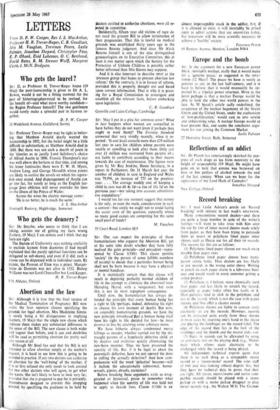Abortion and the law
Sir: Although it is true that the final version of the Medical Termination of Pregnancy Bill now omits the four separate clauses specifying the grounds for legal abortion, Mrs Madeleine Simms is surely being a bit disingenuous in implying (Letters, 19 May) that the single new clause which replaces them makes any substantial difference to the sense of the Bill. The new clause is both wider and vaguer than before, and it can and doubtless will be read as permitting abortion for pretty well any reason at all.
Although Mr Steel has said that his Bill is not Intended to allow abortion simply at the mother's request, it is hard to see how this is going to be avoided in practice. If any two doctors can authorise an abortion for the 'well-being' of the mother, if It is at first refused she only needs to look around for two other doctors who will agree, to get what she wants. She isn't likely to have to look very far, provided that she is prepared to pay for it privately. Amendments designed to prevent this shopping around, by specifying the positions to be held by doctors entitled to authorise abortions, were all re- jected in committee.
Incidentally, fifteen year old victims of rape do not need the present Bill to allow termination of their pregnancies. That this is lawful on medical grounds was established thirty years ago in the famous Bourne judgment. And since Mr Aleck Bourne himself is one of the nine distinguished gynaecologists on its Executive Committee, this at least is one matter upon which the Society for the Protection of Unborn Children is possibly rather better informed than Mrs Simms may suppose.
And it is also incorrect to describe SPUC as the 'pressure group that hopes to prevent abortion law reform.' On the contrary, it is in favour of reform, provided this is properly thought out and based upon correct information. That is why it is press- ing for a Royal Commission to investigate and establish all the relevant facts, before embarking upon legislation.
C. B. Goodhart Gonville and Caius College, Cambridge


































 Previous page
Previous page